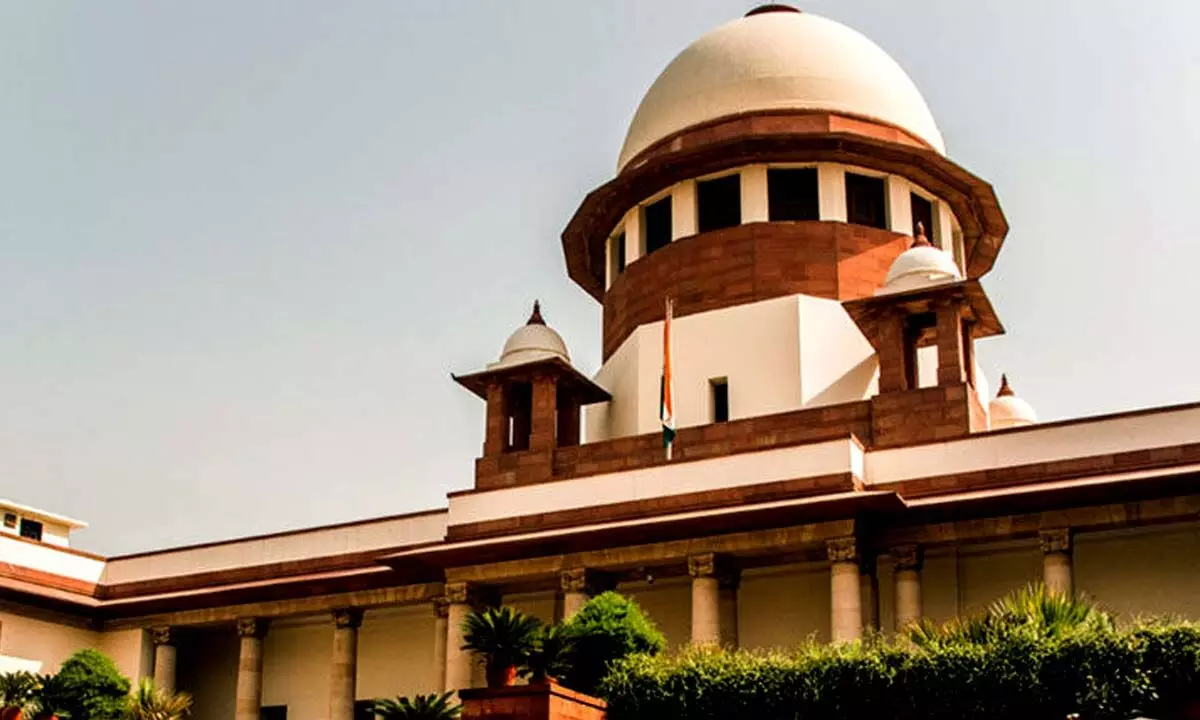Live
- With eye on local body polls, TPCC gears up to rejig body
- Never share OTPs with strangers: DIG Koya Praveen
- Amid Mizzle, Citizens lap up chilly weather
- 5-day FDP held at KSRM Engg College
- Traffic cops debunk claims of discounts on e-Challans
- Elaborate security arrangements made for Vaikunta Ekadasi: SP Subba Rayudu
- Cong flays TTD move to remove non-Hindu staff
- Rising school fee returns to haunt parents in Hyd
- Complete TTD model temple works in Prayagraj: JEO
- TGEC holds meet on fixing private school fees
Just In
Plea in Supreme Court seeks restoration of statehood to J&K in time-bound manner

Supreme Court of India
A plea has been filed before the Supreme Court seeking restoration of statehood to Jammu and Kashmir in a time-bound manner.
New Delhi: A plea has been filed before the Supreme Court seeking restoration of statehood to Jammu and Kashmir in a time-bound manner.
The application said that even after ten months of the SC verdict, the statehood of J&K has not yet been restored "which is gravely affecting the rights of the citizens of Jammu and Kashmir and also violating the idea of federalism".
It said that "formation of the Legislative Assembly before the restoration of Statehood would cause serious reduction of democratically elected government in Jammu and Kashmir causing grave violation of the idea of federalism which forms part of the basic structure of the Constitution of India".
Assembly elections were recently held in Jammu and Kashmir in three phases after a period of 10 years and the results are to be declared on Tuesday.
"In re: Article 370 of the Constitution" verdict, a 5-judge Constitution Bench, headed by CJI D.Y. Chandrachud, had left open the question of whether the Parliament can extinguish the character of statehood by converting a state into one or more Union Territories, relying on the statement made by Solicitor General Tushar Mehta that statehood would be restored to Jammu and Kashmir. However, it had ordered the Election Commission of India to take steps to conduct elections to the Legislative Assembly of Jammu and Kashmir, constituted under Section 14 of the Reorganisation Act, by September 30, 2024 and said that "restoration of statehood shall take place at the earliest and as soon as possible".
The Constitution Bench, also comprising Justices S.K. Kaul, Sanjiv Khanna, B.R. Gavai and Surya Kant, upheld the status of Ladakh as a Union Territory under Article 3(a) read with Explanation I of the Constitution, which permits the formation of a Union Territory by separating a territory from any state.
In the course of the oral hearing, SG Mehta had submitted that the Centre cannot give any exact timeframe and it would take "some time" for the restoration of statehood in Jammu and Kashmir.
Five years back, the Centre, on August 5, 2019, abrogated Article 370 of the Constitution, which conferred special status to Jammu and Kashmir, and on the same day, a reorganisation bill was introduced in Parliament, downgrading and bifurcating the state into two Union Territories of J&K and Ladakh. Several petitions were filed before the apex court, contending that the President had no power to issue a notification declaring that Article 370 ceases to exist and that the Article had assumed a permanent nature after the dissolution of the Constituent Assembly of Jammu and Kashmir.
However, the Supreme Court upheld the Centre's action.
In May this year, it refused to review the Constitution Bench verdict and dismissed a batch of review pleas filed against the decision upholding the revocation of Article 370 as valid. Rejecting the applications seeking listing of the review petition in open court, a five-judge bench headed by CJI Chandrachud, said that there was no error apparent on the face of the record and no case for review was made under the Supreme Court Rules 2013.

© 2024 Hyderabad Media House Limited/The Hans India. All rights reserved. Powered by hocalwire.com






